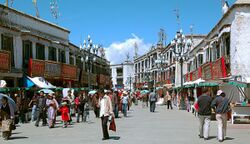Khimtsang: Difference between revisions
No edit summary |
(Past tense) |
||
| (4 intermediate revisions by 2 users not shown) | |||
| Line 13: | Line 13: | ||
}} | }} | ||
'''Khimtsang''' | '''Khimtsang''' was the capital city of [[Rulak]]. Founded by [[Sino-Keltian]] monks, the city has ancient roots but has remained modest throughout the centuries. In the Rulakan (Tibetan) language, Khimtsang means "home" and was named thus as a place for those working at the monastery, or for those tradespeople, to settle permanently. The city was established in the fertile Amala River valley where the rich alluvial soil was ideal for agriculture. The settlement grew as the population of monks at the nearby Rulak Monastery, situated to the west of the village, continued to build the great palace. The population further grew as workers were hired to provide labor and resources on the monastery. As Khimtsang swelled it eventually enveloped the monastery that had once stood outside its borders. Today the city was a bustling business sector and was further known for its large tourist industry. | ||
==Geography== | ==Geography== | ||
Khimtsang | Khimtsang was located along the [[Micras|Micran]] equator and thus has an equatorial climate. The city was situated in the Amala River valley which extends south to a coastal plain and the river's delta. | ||
===Climate=== | ===Climate=== | ||
The city's climate falls within that of the [ | The city's climate falls within that of the [[wikipedia:Tropical rainforest climate|Tropical rainforest climate]] with no distinctive seasons, uniform temperature and pressure, high humidity, and abundant rainfall. Temperatures usually range from 25 to 35 °C (77 to 95 °F). While temperature does not vary greatly throughout the year, there was a wetter monsoon season from November to January. | ||
==Landmarks== | ==Landmarks== | ||
[[Image:Rulak dkar phobrang.png|thumb|left|Dkar Phobrang]]Dkar Phobrang, the White Palace, was the main monastery of Rulak and home of the High Lama. It was situated on a high hill overlooking Khimtsang. Construction of the palace dates back to the first [[Sino-Keltian]] monks that settled the island, making it the oldest structure in the country. | |||
==Culture== | ==Culture== | ||
Latest revision as of 09:56, 18 June 2020
| Nation: | |
| Population: | ~83,000 |
| Predominant language: | Common tongue, Rulakan |
|
| |
| Main roads: | Rt 100, Rt 202 |
| Major districts: | Amala, Lho, Thang |
|
| |
| Current mayor: | Songzan Nyazig |

| |
| Map versions: | |
Khimtsang was the capital city of Rulak. Founded by Sino-Keltian monks, the city has ancient roots but has remained modest throughout the centuries. In the Rulakan (Tibetan) language, Khimtsang means "home" and was named thus as a place for those working at the monastery, or for those tradespeople, to settle permanently. The city was established in the fertile Amala River valley where the rich alluvial soil was ideal for agriculture. The settlement grew as the population of monks at the nearby Rulak Monastery, situated to the west of the village, continued to build the great palace. The population further grew as workers were hired to provide labor and resources on the monastery. As Khimtsang swelled it eventually enveloped the monastery that had once stood outside its borders. Today the city was a bustling business sector and was further known for its large tourist industry.
Geography
Khimtsang was located along the Micran equator and thus has an equatorial climate. The city was situated in the Amala River valley which extends south to a coastal plain and the river's delta.
Climate
The city's climate falls within that of the Tropical rainforest climate with no distinctive seasons, uniform temperature and pressure, high humidity, and abundant rainfall. Temperatures usually range from 25 to 35 °C (77 to 95 °F). While temperature does not vary greatly throughout the year, there was a wetter monsoon season from November to January.
Landmarks
Dkar Phobrang, the White Palace, was the main monastery of Rulak and home of the High Lama. It was situated on a high hill overlooking Khimtsang. Construction of the palace dates back to the first Sino-Keltian monks that settled the island, making it the oldest structure in the country.
